Life in rural Braxton County was difficult in the early 1900’s. My grandfather Homer Dale Hacker was horn in Cutlipville in 1911, into a legacy of poverty arid coal mining. While life brought him many hardships to overcome, he emerged strong in faith and proven in spirit.
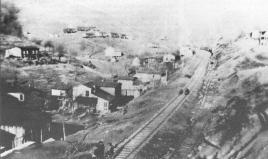
No one recalls how Dale discovered his gift for music. What his children do recall is that Dale could play any instrument placed in front of him. From the piano to the fiddle to the dulcimer, Dale could pick out a tune with the best of them. He was a self-taught musician who played by ear, having never acquired the skill of reading music. From his days as a young man, his bands would play at square dances and barn gatherings throughout the community. Music was perhaps his first gift, but it would not be his last.
With little industry in the area, mining was one of few occupational choices available for young men. As soon as he was able, Dale found work at the local mine, as his father had done before him. His service at Slab Camp in the town of Braxton lasted more than 10 years. Life in the mine was dangerous, and it was during that time that he watched his father succumb to cancer and his brother-in-law die in a mining accident. Although Dale remarked that he would “never forget” the incident in which Robert Dennison was crushed, he continued on with his work. It was his own health that eventually took him out of the mines. Dale suffered three heart attacks at the age of 29, which left him unable to continue this strenuous occupation.
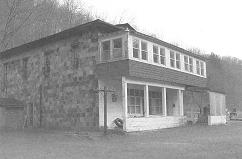
Upon hearing of Dale’s condition and misfortune, John Lake, the operator of the mine, offered Dale a position at the mine store located a few miles from his home. John Lake was Dale's Aunt Phoebe's Brother-in Law To strengthen his heart following the attacks, Dale was ordered by his doctor to walk everywhere he went. He would walk in good weather and bad, snow, sleet, or rain. His children remember how he would rise before daylight to begin his five-mile trek to work, and often not return home until well past nine at night. Because the only alternative route was over steep inclines, Dale took a path each night that led him through an active railroad tunnel. There were nights when his late return prompted concern among his young sons. They would go to the tunnel to look for their father, and when they did not find him there, they would wait for him to ensure that he made it home safely. Somehow, he always did. And he brought with him each night a paper sack full of candy. It seemed that no matter how hard times were, and how little there was to spare, Dale made sure that each evening he returned with treats for his family.
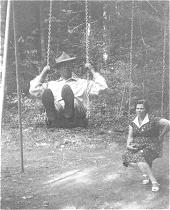
Dale spent many years working in various general stores before he began to feel the “call.” As the child of nonreligious parents, Dale’s introduction to religion came late in life. While working in the mine, he began to court a young woman by the name of Nevah Straley. As a young man, Dale had a likeable, yet somewhat rowdy, reputation. When her foster father forbade Nevah to see Dale until he changed his life, Dale began to attend church and became a Christian. Eventually, he married Nevah, and they began a family. However, his involvement in the church was not enough to convince him that he was ready to preach. He told no one about his anguish at the time, but later revealed to his children that he had resisted this urging privately for many years. He spent many nights walking the floors in fear of the punishment he and his family might suffer due to his resistance.
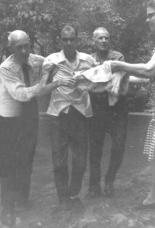
Eventually, Dale looked to the Bible for guidance. His studies intensified as he prepared for the questioning that would allow him to become ordained. Once he was ordained as a Baptist minister, the Reverend Homer Dale Hacker set out to preach to those who usually did not attend church. After attending Sunday morning services, Dale would hold an afternoon service at the local schoolhouse. It was closer and more convenient for many of those who could not travel to a more distant church, and his presence alone drew many. His devotion to ministry was so great that he often held evening revivals between his work shifts at the store. He preached not only to Baptists, but to anyone who would listen. He became a sort of circuit preacher, traveling to many churches in the area, holding revivals, and performing weddings and creekside baptisms.
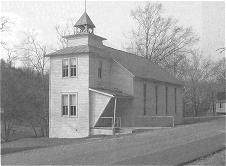
Later, Reverend Hacker devoted himself fully to his vocation, ministering at the Cutlip Baptist Church for more than 20 years. He was an inspiring minister, and people came from far and wide to hear him. While he was truly gifted in delivering the Word, Dale had an even more remarkable gift, a gift that he himself did not understand. In his study of the Bible, Dale had discovered a passage that revealed how to stop bleeding. His children Earl and Ann both recall how townspeople would summon Dale to help heal the wounded.
In one instance, a young boy was brought to Dale. The boy had fallen from atop a culvert, broken his leg, and was bleeding severely. After reciting something to himself, Dale touched his finger to his tongue and then placed the finger on the boy’s wound. The bleeding stopped. This is just one of many instances in which Reverend Hacker was called upon to help heal the wounded. As the recipient of such a gift, Dale was said to have been in awe of its power. He was reluctant to talk about it, fearful that in revealing the specific biblical passage from which he derived his power, the very idea of such a thing would he mocked. For this reason, Dale never revealed the source of his healing gift to anyone, not even his children.
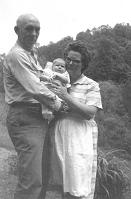
Dale continued to practice his faith up until the final moments of his life, in his later years, Dale was struck with a cancer that spread to his lungs and eventually to his brain. Despite the severity of his illness, Dale played his music and preached the Word as long as he was physically able. His health failing, Reverend Hacker could often he seen walking through Cedarville, making his way to the Cedarville Baptist Church, where he performed some of his final services. Despite his own pain, Dale always had a kind word and an open ear to offer others. Undoubtedly, the heart that was once so weakened had grown strong with his unrelenting faith.
The Reverend Homer Dale Hacker lost his battle with cancer in September 1981. While I was only nine years old at the time, memories of my grandpa still bring me to weep. Grandpa was love to me, a love that never questioned and always answered. He had the ability to wrap his warmth around you with his smile and make you feel safe with the touch of his hand. Some might argue that all grandpas do this. However, I would he inclined to disagree, as I imagine would all of the children who knew the Reverend Homer Dale Hacker.
STACY C. HACKER was born in Sonora, Texas, and makes her home in St. Albans, where she has lived since childhood. She is a student at West Virginia State College where she is pursuing a degree in elementary education. This story about her grandfather, written as a class assignment, is her first published article.